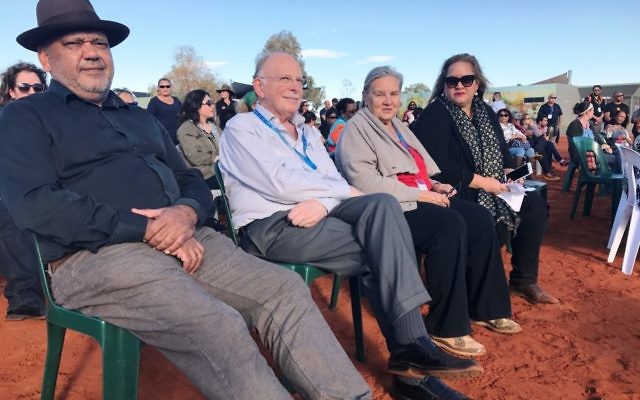Reflections on reconciliation
Reconciliation advocate Mark Leibler is “reasonably optimistic” about the prospects of a meaningful place for Aborigines and Torres Strait Islanders in Australia’s Constitution.

HALF a century after the May 1967 referendum in which Australians agreed to include Indigenous people in the national census and allow the federal government to make laws for them, reconciliation advocate Mark Leibler is “reasonably optimistic” about the prospects of a meaningful place for Aborigines and Torres Strait Islanders in Australia’s Constitution.
The referendum, which came five years after Aborigines were granted the vote in federal elections, provided a small start to reconciliation.
At what he described as a “simple and poignant” closing ceremony of a 50th-anniversary convention of Indigenous leaders at Uluru last week, Leibler, co-chair of the Referendum Council on constitutional recognition of Aboriginal and Torres Strait Islander peoples, was presented with an ancient shield by the Anangu people, traditional owners of Uluru.
“There have been many productive discussions and it is now time to move to action,” he told the gathering. “I hope the convention and ongoing deliberations will set the direction for the nation to move forward in a way that’s positive for Aboriginal and Torres Strait Islander peoples, and for us all.”
The Indigenous Constitutional Convention has called for an Indigenous advisory body to be enshrined in the Constitution, rather than the option of merely a Constitutional reference to Indigenous people.
While it raises the stakes in the debate about how to constitutionally recognise Indigenous people, Leibler told The AJN it would be wrong to pre-empt the Referendum Council’s report into what is “an Indigenous owned and designed process”. The report is due to be submitted to the PM and Opposition leader on June 30.
Leibler said the Referendum Council “is not going to recommend something which is actually opposed by Aboriginal Australians … We have to look at all the various options that went out for consultation”, including responses of Indigenous Australians and Australians in general.
Leibler, who authored a 2006 essay, Crossing the Wilderness: Jews and Reconciliation, reflected that several Jewish leaders have been prominently associated with Indigenous reconciliation.
“Too many Aboriginals and Torres Strait Islanders live in conditions that are worse than in third-world countries,” he lamented.
In 2010, Leibler was appointed co-chair of the Expert Panel on Constitutional Recognition of Indigenous Australians, after serving for more than a decade with Reconciliation Australia. He became the Referendum Council’s co-chair in 2015.
PETER KOHN

comments